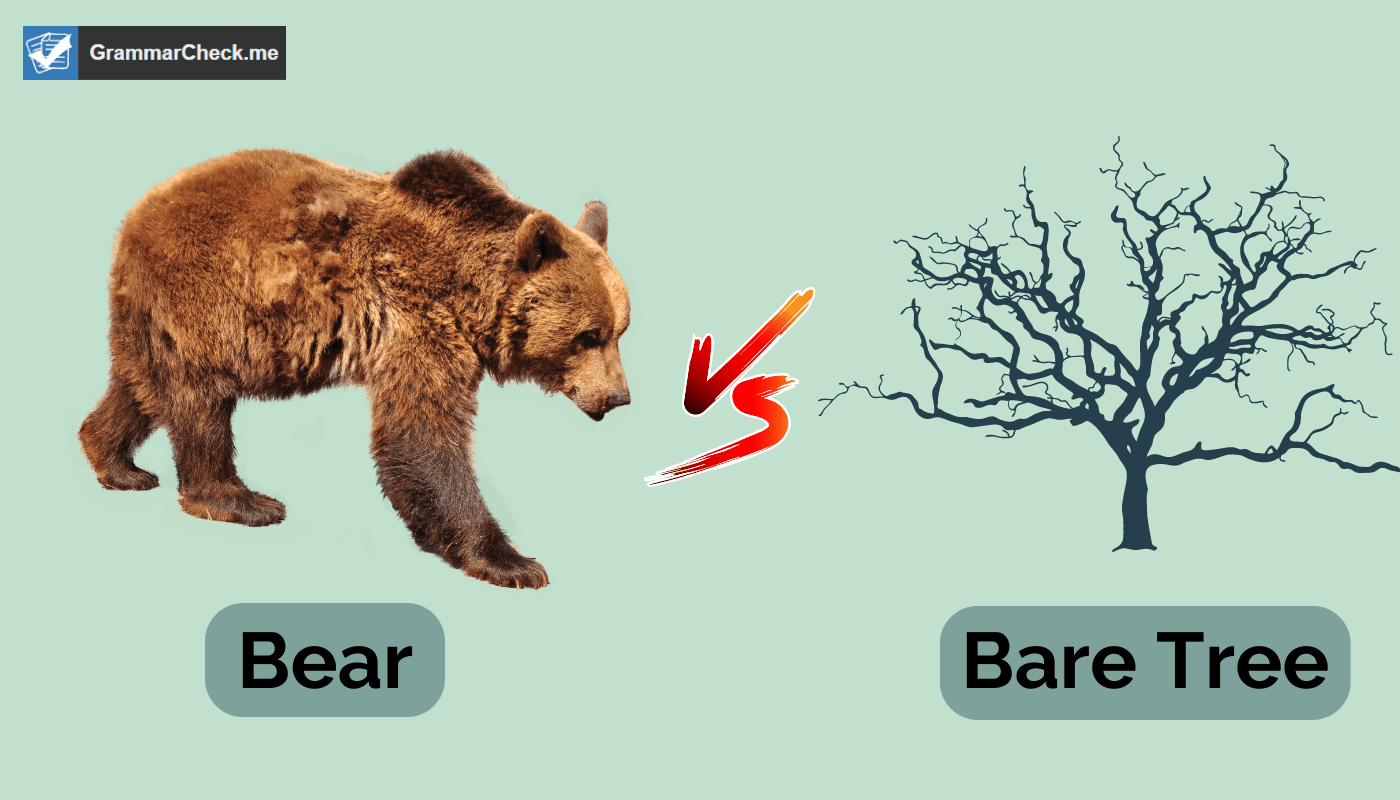The English language is full of tricky phrases. Recently, I have gotten many questions on the difference between bear with me or bare with me. Which is the correct spelling? If you are trying to say be patient, then you should be saying “bear with me”. In this post, we’ll break down the different meanings of these two phrases.
Which Is The Correct Spelling: Bear With Me or Bare With Me?

By swapping just two letters in the word bear, you can completely change the subject of a sentence. This is very similar to the nonetheless or nevertheless grammar rules. The correct expression is “bear with me” if you are asking someone to have patience in a particular situation. Here is the main differences between these two expressions.
- Bear With Me – This phrase is used to request patience and understanding for some challenging task that is likely to take longer than expected.
- Bare With Me – This expression is not grammatically correct. The word ‘bare’ is a verb that can mean to uncover or strip away, and when used casually in conversation it can often add an interesting dynamic.
Takeaway: Use the phrase “Bear with me” to request patience.
Bear With Me In A Sentence
- “Bear with me while I double-check these calculations.”
- “Bear with me—I just need a few seconds to find the right words.”
- “Bear with me while I work out this difficult situation in my life.”
- “Bear with me for a second—I’m going to try something new here!”
- “You are going to have to bear with me today, I have been through a lot.”
- “Relax, bear with me here; I’m just trying to get to the bottom of things.”
- “I just got into a car accident, so you’re going to have to bear with me and push the meeting back to tomorrow.”
When To Use Bear
The word ‘bear’ can both be a noun and a verb, causing occasional confusion as to when it can be used correctly. Just like with the words to late or too late, the intended meaning of the word changes depending on the context of the writing or conversation.
As a noun, Bear refers to a large mammal (i.e Grizzly Bear or Black Bear). Just don’t confuse pronoun vs noun as they are two different things!
- I just saw a Grizzly bear running in the backyard!
- The is a Black bear eating my neighbor’s trash.
It can also be used to show that something is difficult to deal with.
- The grill is a bear to clean.
- The Poconos race track is a bear to drive on.
As an action verb, bear means carrying or supporting something heavy.
- I can’t bear seeing my daughter upset.
- I gave up because I could no longer bear the pain.
Bear can also be used as a verb meaning to give birth or to move while supporting someone or something.
- Mark bears a strong resemblance to his father.
- Maria had to bear a child at the end of her pregnancy.
Takeaway: Bear can be used as both a noun and a verb.
When To Use Bare
Just like with the word however, It can be tricky to know when to use the word “bare.” Generally speaking, it usually functions as an adjective or a verb.
Bare as a descriptive adjective is normally used to denote something that is unclothed or to indicate a lack of something.
- Bare branches of a tree.
- I can see the bare toes of a beachgoer.
- This room is barely decorated.
- If you really care about me, why is your facial expression so bare?
The verb “bare” is often used to talk about uncovering or exposing something to view or to the elements. Just like the verb drive safe, it can be changed to an adverb by adding -ly.
- Mark bared his chest so that it was visible to everyone.
Takeaway: Bare is mostly used as an adjective or verb.
Frequently Asked Questions
It depends on the context of the sentence. Bare is a verb that means to “to uncover.” To bear something means to endure or be patient. So, if you’re bearing the cold, you’re enduring it patiently. If you’re barefoot, your feet are uncovered.
The phrase “bear with me” is typically used to ask someone to be patient or to hear you out. So, figuratively, when someone asks you to bear with them, they’re asking you to carry them through what might be a difficult situation.
It depends on the context. “Bare” can mean either to uncover or to be free from obstruction. So if you’re asking whether it’s correct to use “bear” instead of “bare” in a particular context, then you need to look at the meaning of that context and decide which one makes more sense.
To start, the phrase “bare with me” is grammatically incorrect. The correct phrase is “bear with me”. The words bear and bare seem similar but are spelled differently for a reason.
The Bottom Line
By now you know that the correct phrase is bear with me. Just like the words idea or ideal, the English language is fully of confusing expressions. This phrase is used to ask for patience in a situation. The word bare is used for different reasons. You might say something is “bare bones” to indicate something is lacking. It is easy to confuse bear and bare, but you are now armed with the knowledge to avoid making silly grammatical mistakes. Use our free spell-checking tool to double-check your work if you are having doubts!
